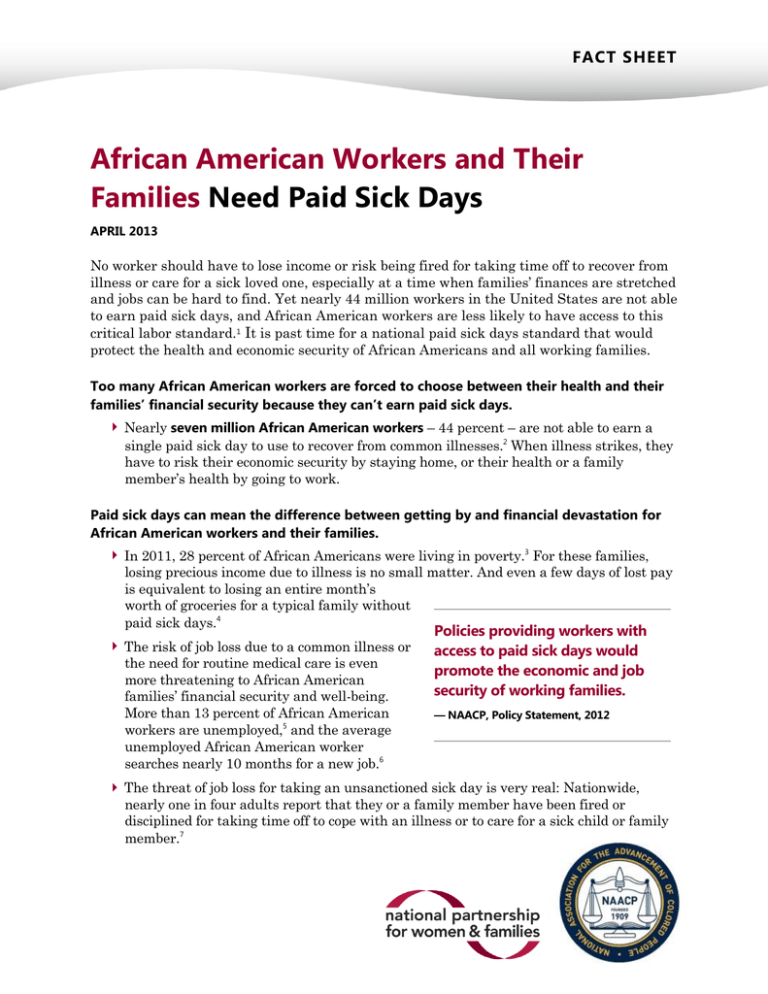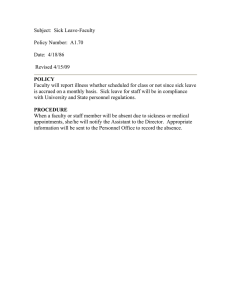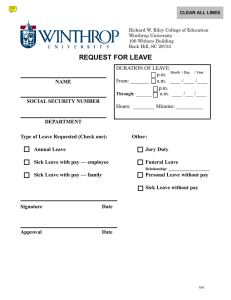
FACT SHEET
African American Workers and Their
Families Need Paid Sick Days
APRIL 2013
No worker should have to lose income or risk being fired for taking time off to recover from
illness or care for a sick loved one, especially at a time when families’ finances are stretched
and jobs can be hard to find. Yet nearly 44 million workers in the United States are not able
to earn paid sick days, and African American workers are less likely to have access to this
critical labor standard.1 It is past time for a national paid sick days standard that would
protect the health and economic security of African Americans and all working families.
Too many African American workers are forced to choose between their health and their
families’ financial security because they can’t earn paid sick days.
Nearly seven million African American workers – 44 percent – are not able to earn a
single paid sick day to use to recover from common illnesses.2 When illness strikes, they
have to risk their economic security by staying home, or their health or a family
member’s health by going to work.
Paid sick days can mean the difference between getting by and financial devastation for
African American workers and their families.
In 2011, 28 percent of African Americans were living in poverty.3 For these families,
losing precious income due to illness is no small matter. And even a few days of lost pay
is equivalent to losing an entire month’s
worth of groceries for a typical family without
paid sick days.4
The risk of job loss due to a common illness or
the need for routine medical care is even
more threatening to African American
families’ financial security and well-being.
More than 13 percent of African American
workers are unemployed,5 and the average
unemployed African American worker
searches nearly 10 months for a new job.6
Policies providing workers with
access to paid sick days would
promote the economic and job
security of working families.
— NAACP, Policy Statement, 2012
The threat of job loss for taking an unsanctioned sick day is very real: Nationwide,
nearly one in four adults report that they or a family member have been fired or
disciplined for taking time off to cope with an illness or to care for a sick child or family
member.7
African American workers need – and want – a basic workplace standard of paid sick days.
Currently, no federal law guarantees workers the right to earn paid sick days.
Connecticut is the only state with a law that gives some workers this basic right, as do
the cities of San Francisco, Washington, D.C., Seattle and Portland, Oregon.
The Healthy Families Act (H.R. 1286/S. 631) would enable workers in businesses with
15 or more employees to earn up to seven paid sick days a year to recover from shortterm illness, care for a sick family member, seek routine medical care, or deal with the
effects of domestic or sexual violence.
The Healthy Families Act would ensure that an additional 3.9 million African American
workers are able to earn paid sick days (a 60 percent increase). It would help to ensure
that African American workers have the job stability and economic security they need to
take care of their own health and the health of their family members.
Ninety-five percent of African Americans support a federal law that would create a
paid sick days standard.8
Learn more at www.PaidSickDays.org.
1 Institute for Women’s Policy Research. (2011, March). Paid Sick Day Access Rates by Gender and Race/Ethnicity. Retrieved 14 November 2012, from
http://www.iwpr.org/publications/pubs/paid-sick-day-access-rates-by-gender-and-race-ethnicity-2010
2 Institute for Women’s Policy Research. (2011, March). Paid Sick Day Access Rates by Gender and Race/Ethnicity. Retrieved 24 August 2012, from
http://www.iwpr.org/publications/pubs/paid-sick-day-access-rates-by-gender-and-race-ethnicity-2010; U.S. Census Bureau. Table B24010B: Sex by Occupation for the Civilian
Employed Population (Black or African-American Alone). Retrieved 12 October 2012, from
http://factfinder2.census.gov/faces/tableservices/jsf/pages/productview.xhtml?pid=ACS_11_1YR_B24010B&prodType=table (Unpublished calculation)
3 DeNavas-Walt, C., Proctor, B., & Smith, J. (2012, September). Income, Poverty, and Health Insurance Coverage in the United States: 2011. U.S. Census Bureau Publication.
Retrieved 12 October 2012, from http://www.census.gov/prod/2012pubs/p60-243.pdf
4 Gould, E., Filion, K., & Green, A. (2011, June). The need for paid sick days: The lack of a federal policy further erodes family economic security. Economic Policy Institute
Publication. Retrieved 14 November 2012, from http://www.epi.org/publication/the_need_for_paid_sick_days/
5 U.S. Bureau of Labor Statistics. (2012, October 5). Employment status of the civilian population by race, sex, and age (Table A-2). Retrieved 12 October 2012, from
http://www.bls.gov/news.release/empsit.t02.htm
6 U.S. Bureau of Labor Statistics. (2012, November 2). Unemployed persons by age, sex, race, Hispanic or Latino ethnicity, marital status and duration of unemployment (Table A36). Retrieved 14 November 2012, from http://www.bls.gov/web/empsit/cpseea36.htm
7 Smith, T., & Kim, J. (2010, June). Paid Sick Days: Attitudes and Experiences (p. 6). National Opinion Research Center at the University of Chicago for the Public Welfare
Foundation Publication. Retrieved 14 November 2012, from http://www.publicwelfare.org/resources/DocFiles/psd2010final.pdf
8 Ibid.
The National Partnership for Women & Families is a nonprofit, nonpartisan advocacy group dedicated to promoting fairness in the workplace, access to quality health care and
policies that help women and men meet the dual demands of work and family. More information is available at www.NationalPartnership.org.
Founded in 1909, the NAACP is the nation's oldest and largest civil rights organization. Its members throughout the United States and the world are the premier advocates for
civil rights in their communities, conducting voter mobilization and monitoring equal opportunity in the public and private sectors. More information is available at
www.NAACP.org.
© 2013 National Partnership for Women & Families and NAACP. All rights reserved.
NATIONAL PARTNERSHIP FOR WOMEN & FAMILIES | NAACP | FACT SHEET | AFRICAN AMERICANS NEED PAID SICK DAYS
2



